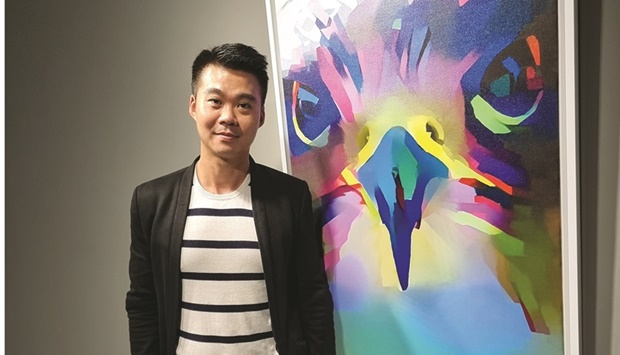The growing interest in Artificial Intelligence (AI) art in Qatar provides an opportunity for artists to explore the various potentials of the technology to create exceptional pieces, a university professor and media artist has said.
“AI art is something that I promote and since people have varied creativity, we will have different possibilities and stories to tell,” Dr James She, an Associate Professor in the College of Science and Engineering at Hamad Bin Khalifa University Qatar, told Gulf Times.
He was speaking on the sidelines of his latest exhibition titled 'Keep Flying: AI Art and Arabic Heritage,’ taking place until May 31 at Katara – the Cultural Village Building 19.
The unique show features a collection of 15 human and machine co-generated paintings that highlight one of Qatar’s and the Gulf’s treasured and living heritage, falconry.
Dr She’s latest exhibition, which showcases artworks that were produced using the AI technology Style Transfer, aims to show the distinguishable features of falcons and falconers in a new way while preserving their original aesthetics and sentimental values.
With AI art, Dr She said that artists in Qatar and the region can go beyond using traditional techniques and materials in telling an interesting local story.
“AI art is something that I promote and since people have varied creativity, we will have different possibilities and stories to tell,” Dr James She, an Associate Professor in the College of Science and Engineering at Hamad Bin Khalifa University Qatar, told Gulf Times.
He was speaking on the sidelines of his latest exhibition titled 'Keep Flying: AI Art and Arabic Heritage,’ taking place until May 31 at Katara – the Cultural Village Building 19.
The unique show features a collection of 15 human and machine co-generated paintings that highlight one of Qatar’s and the Gulf’s treasured and living heritage, falconry.
Dr She’s latest exhibition, which showcases artworks that were produced using the AI technology Style Transfer, aims to show the distinguishable features of falcons and falconers in a new way while preserving their original aesthetics and sentimental values.
With AI art, Dr She said that artists in Qatar and the region can go beyond using traditional techniques and materials in telling an interesting local story.



“If you can make a machine artistic and ‘culturally aware’, a lot of applications will become really powerful and relevant to the local community,” he pointed out.
However, Dr She underlined the need to continuously innovate and be more creative in either modifying or developing new AI technologies.
“There is no magic, AI is a technology, it is an algorithm that learns data, and it is like a human, you learn by data but if you don’t educate that person about culture (for example), then it is hard to do a good job,” he said, citing the key role that AI plays in various sectors of the society.
“In education, you look for a lot of visual content, it is not about art but you want to make things look attractive and artistic but you also want to make it culturally matching to your audience,” noted Dr She, who discussed ‘AI for calligraphy’ in November last year. “Calligraphy is something really important in this region, in this culture, so you can see a lot of application.”


